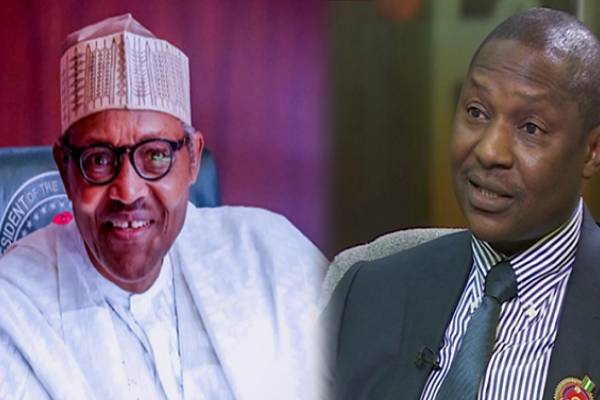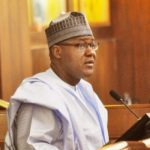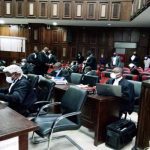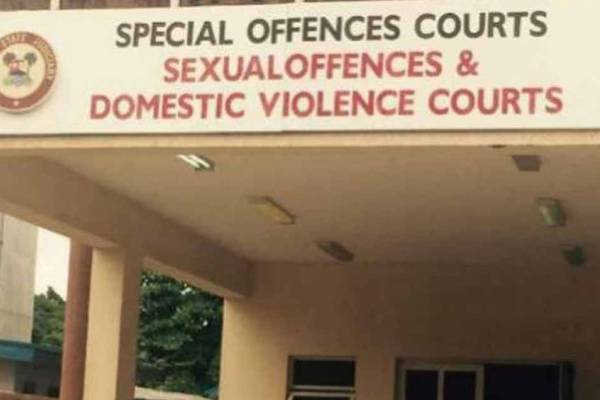The Supreme Court has scheduled hearing for May 19th in the suit by President Muhammadu Buhari and the Attorney General of the Federation(AGF) and Minister of Justice, Abubakar Malami against Section 84(12) of the amended Electoral Act 2022.
The suit was filed before the Supreme Court on April 29, 2022, marked: SC/CV/504/2022 and has the National Assembly as the sole defendant.https://www.tvcnews.tv/wp-admin/post-new.php#
The plaintiffs are contending among others, that the said section of the Electoral Act 2022 is in conflict with constitutional provisions.
They noted that the Constitution has made provisions for qualifications and disqualifications for the offices of the President and Vice President, Governor and Deputy-Govemor, Senate and House of Representatives, and House of Assembly, Ministers, Commissioners and Special Advisers.https://www.tvcnews.tv/wp-admin/post-new.php#
President Buhari and AGF Malami added that the same Constitution has equally “the qualifying factors for election into the office of President, Vice President. Governor, Deputy Gavemor, Senate, House of Representatives, Houses of Assembly and Ministers.”
The plaintiffs are praying the Supreme Court for the following reliefs in the matter:
*A declaration that by the joint and or combined reading of Sections 65, 66, 106, 107, 131, 137, 147, 151, 177, 182, 192 and 196, of the Constitution of the Federal Republic of Nigeria, 1999, (as amended), the provisions of section 84 (12) of the Electoral Act, 2022 which also ignores Section 84(3) of the same Act, is an additional qualifying and/or disqualifying factors for the National Assembly, House of Assembly, Gubernatorial and Presidential elections as enshrined in the said constitution, hence unconstitutional, unlawful, null and void.
*A declaration that having regard to the clear provision of section 1(3) of the Constitution of the Federal Republic of Nigeria, 1999, as amended, read together with section 4 of the same Constitution, the legislative powers vested in the Defendant do not permit or empower # to make any other law prescribing additional qualifying /disqualifying grounds for election to the National Assembly, House of Assembly, Gubernatorial and Presidential election outside the express constitutional qualification and disqualification provisions as already provided in each or all of Sections 65, 66, 106, 107, 131, 137, 147, 151, 177, 182, 192 and 196 of the 1999 Constitution of the Federal Republic of Nigeria (as amended), and without amendment to any of those sections is for reason of inconsistency, unconstitutional and therefore null and void.
*A declaration that section 84 (12) of the Electoral Act, 2022 disqualifying a political appointee from being a voting delegate or be voted for at a convention or congress of any political party for the purpose of the nomination of candidates for any election is discriminatory, inconsistent with and in violent breach of the provision of each or all of Sections 42, 65, 66, 106, 107, 131, 137, 147, 151, 177, 182, 192 and 196 of the Constitution of the Federal Republic of Nigeria, 1999, (as amended), as well as Article 2 of the African Charter on Human and Peoples Rights and some is null and void by reason of its inconsistency.
*A declaration that by the introduction of the provisions of Section 84(12) into the Electoral Act, 2022, but in disregard of Section 84(3) of the some Act, the Defendant has acted ultra vires the legislative powers vested in it under the provision of section 4 of the Constitution of the Federal Republic of Nigeria, 1999 (as amended) and/or in violation or breach of the provisions of Sections 65, 66, 106, 107, 131, 137, 147, 151, 177, 182, 192 and 196, thereby rendering Section 84(12) of the Electoral Act, 2022 unconstitutional, null and void.
*An order nullifying the provisions of Section 84 (12) of the Electoral Act, 2022 by application of the blue pencil rule, for being unconstitutional, illegal, null and void and having been made in excess of the legislative powers of the defendant as enshrined in Section 4 of the 1999 Constitution (as amended).
This will be the first time this dispute is going before the Supreme Court since the controversy over the Section 84(12) broke out shortly after the first amendment of the bill was rejected by President Muhammadu Buhari.
The Supreme Court has scheduled hearing for May 19th in the suit by President Muhammadu Buhari and the Attorney General of the Federation(AGF) and Minister of Justice, Abubakar Malami against Section 84(12) of the amended Electoral Act 2022.
The suit was filed before the Supreme Court on April 29, 2022, marked: SC/CV/504/2022 and has the National Assembly as the sole defendant.https://www.tvcnews.tv/wp-admin/post-new.php#
The plaintiffs are contending among others, that the said section of the Electoral Act 2022 is in conflict with constitutional provisions.
They noted that the Constitution has made provisions for qualifications and disqualifications for the offices of the President and Vice President, Governor and Deputy-Govemor, Senate and House of Representatives, and House of Assembly, Ministers, Commissioners and Special Advisers.https://www.tvcnews.tv/wp-admin/post-new.php#
President Buhari and AGF Malami added that the same Constitution has equally “the qualifying factors for election into the office of President, Vice President. Governor, Deputy Gavemor, Senate, House of Representatives, Houses of Assembly and Ministers.”
The plaintiffs are praying the Supreme Court for the following reliefs in the matter:
*A declaration that by the joint and or combined reading of Sections 65, 66, 106, 107, 131, 137, 147, 151, 177, 182, 192 and 196, of the Constitution of the Federal Republic of Nigeria, 1999, (as amended), the provisions of section 84 (12) of the Electoral Act, 2022 which also ignores Section 84(3) of the same Act, is an additional qualifying and/or disqualifying factors for the National Assembly, House of Assembly, Gubernatorial and Presidential elections as enshrined in the said constitution, hence unconstitutional, unlawful, null and void.
*A declaration that having regard to the clear provision of section 1(3) of the Constitution of the Federal Republic of Nigeria, 1999, as amended, read together with section 4 of the same Constitution, the legislative powers vested in the Defendant do not permit or empower # to make any other law prescribing additional qualifying /disqualifying grounds for election to the National Assembly, House of Assembly, Gubernatorial and Presidential election outside the express constitutional qualification and disqualification provisions as already provided in each or all of Sections 65, 66, 106, 107, 131, 137, 147, 151, 177, 182, 192 and 196 of the 1999 Constitution of the Federal Republic of Nigeria (as amended), and without amendment to any of those sections is for reason of inconsistency, unconstitutional and therefore null and void.
*A declaration that section 84 (12) of the Electoral Act, 2022 disqualifying a political appointee from being a voting delegate or be voted for at a convention or congress of any political party for the purpose of the nomination of candidates for any election is discriminatory, inconsistent with and in violent breach of the provision of each or all of Sections 42, 65, 66, 106, 107, 131, 137, 147, 151, 177, 182, 192 and 196 of the Constitution of the Federal Republic of Nigeria, 1999, (as amended), as well as Article 2 of the African Charter on Human and Peoples Rights and some is null and void by reason of its inconsistency.
*A declaration that by the introduction of the provisions of Section 84(12) into the Electoral Act, 2022, but in disregard of Section 84(3) of the some Act, the Defendant has acted ultra vires the legislative powers vested in it under the provision of section 4 of the Constitution of the Federal Republic of Nigeria, 1999 (as amended) and/or in violation or breach of the provisions of Sections 65, 66, 106, 107, 131, 137, 147, 151, 177, 182, 192 and 196, thereby rendering Section 84(12) of the Electoral Act, 2022 unconstitutional, null and void.
*An order nullifying the provisions of Section 84 (12) of the Electoral Act, 2022 by application of the blue pencil rule, for being unconstitutional, illegal, null and void and having been made in excess of the legislative powers of the defendant as enshrined in Section 4 of the 1999 Constitution (as amended).
This will be the first time this dispute is going before the Supreme Court since the controversy over the Section 84(12) broke out shortly after the first amendment of the bill was rejected by President Muhammadu Buhari.
The Supreme Court has scheduled hearing for May 19th in the suit by President Muhammadu Buhari and the Attorney General of the Federation(AGF) and Minister of Justice, Abubakar Malami against Section 84(12) of the amended Electoral Act 2022.
The suit was filed before the Supreme Court on April 29, 2022, marked: SC/CV/504/2022 and has the National Assembly as the sole defendant.https://www.tvcnews.tv/wp-admin/post-new.php#
The plaintiffs are contending among others, that the said section of the Electoral Act 2022 is in conflict with constitutional provisions.
They noted that the Constitution has made provisions for qualifications and disqualifications for the offices of the President and Vice President, Governor and Deputy-Govemor, Senate and House of Representatives, and House of Assembly, Ministers, Commissioners and Special Advisers.https://www.tvcnews.tv/wp-admin/post-new.php#
President Buhari and AGF Malami added that the same Constitution has equally “the qualifying factors for election into the office of President, Vice President. Governor, Deputy Gavemor, Senate, House of Representatives, Houses of Assembly and Ministers.”
The plaintiffs are praying the Supreme Court for the following reliefs in the matter:
*A declaration that by the joint and or combined reading of Sections 65, 66, 106, 107, 131, 137, 147, 151, 177, 182, 192 and 196, of the Constitution of the Federal Republic of Nigeria, 1999, (as amended), the provisions of section 84 (12) of the Electoral Act, 2022 which also ignores Section 84(3) of the same Act, is an additional qualifying and/or disqualifying factors for the National Assembly, House of Assembly, Gubernatorial and Presidential elections as enshrined in the said constitution, hence unconstitutional, unlawful, null and void.
*A declaration that having regard to the clear provision of section 1(3) of the Constitution of the Federal Republic of Nigeria, 1999, as amended, read together with section 4 of the same Constitution, the legislative powers vested in the Defendant do not permit or empower # to make any other law prescribing additional qualifying /disqualifying grounds for election to the National Assembly, House of Assembly, Gubernatorial and Presidential election outside the express constitutional qualification and disqualification provisions as already provided in each or all of Sections 65, 66, 106, 107, 131, 137, 147, 151, 177, 182, 192 and 196 of the 1999 Constitution of the Federal Republic of Nigeria (as amended), and without amendment to any of those sections is for reason of inconsistency, unconstitutional and therefore null and void.
*A declaration that section 84 (12) of the Electoral Act, 2022 disqualifying a political appointee from being a voting delegate or be voted for at a convention or congress of any political party for the purpose of the nomination of candidates for any election is discriminatory, inconsistent with and in violent breach of the provision of each or all of Sections 42, 65, 66, 106, 107, 131, 137, 147, 151, 177, 182, 192 and 196 of the Constitution of the Federal Republic of Nigeria, 1999, (as amended), as well as Article 2 of the African Charter on Human and Peoples Rights and some is null and void by reason of its inconsistency.
*A declaration that by the introduction of the provisions of Section 84(12) into the Electoral Act, 2022, but in disregard of Section 84(3) of the some Act, the Defendant has acted ultra vires the legislative powers vested in it under the provision of section 4 of the Constitution of the Federal Republic of Nigeria, 1999 (as amended) and/or in violation or breach of the provisions of Sections 65, 66, 106, 107, 131, 137, 147, 151, 177, 182, 192 and 196, thereby rendering Section 84(12) of the Electoral Act, 2022 unconstitutional, null and void.
*An order nullifying the provisions of Section 84 (12) of the Electoral Act, 2022 by application of the blue pencil rule, for being unconstitutional, illegal, null and void and having been made in excess of the legislative powers of the defendant as enshrined in Section 4 of the 1999 Constitution (as amended).
This will be the first time this dispute is going before the Supreme Court since the controversy over the Section 84(12) broke out shortly after the first amendment of the bill was rejected by President Muhammadu Buhari.
The Supreme Court has scheduled hearing for May 19th in the suit by President Muhammadu Buhari and the Attorney General of the Federation(AGF) and Minister of Justice, Abubakar Malami against Section 84(12) of the amended Electoral Act 2022.
The suit was filed before the Supreme Court on April 29, 2022, marked: SC/CV/504/2022 and has the National Assembly as the sole defendant.https://www.tvcnews.tv/wp-admin/post-new.php#
The plaintiffs are contending among others, that the said section of the Electoral Act 2022 is in conflict with constitutional provisions.
They noted that the Constitution has made provisions for qualifications and disqualifications for the offices of the President and Vice President, Governor and Deputy-Govemor, Senate and House of Representatives, and House of Assembly, Ministers, Commissioners and Special Advisers.https://www.tvcnews.tv/wp-admin/post-new.php#
President Buhari and AGF Malami added that the same Constitution has equally “the qualifying factors for election into the office of President, Vice President. Governor, Deputy Gavemor, Senate, House of Representatives, Houses of Assembly and Ministers.”
The plaintiffs are praying the Supreme Court for the following reliefs in the matter:
*A declaration that by the joint and or combined reading of Sections 65, 66, 106, 107, 131, 137, 147, 151, 177, 182, 192 and 196, of the Constitution of the Federal Republic of Nigeria, 1999, (as amended), the provisions of section 84 (12) of the Electoral Act, 2022 which also ignores Section 84(3) of the same Act, is an additional qualifying and/or disqualifying factors for the National Assembly, House of Assembly, Gubernatorial and Presidential elections as enshrined in the said constitution, hence unconstitutional, unlawful, null and void.
*A declaration that having regard to the clear provision of section 1(3) of the Constitution of the Federal Republic of Nigeria, 1999, as amended, read together with section 4 of the same Constitution, the legislative powers vested in the Defendant do not permit or empower # to make any other law prescribing additional qualifying /disqualifying grounds for election to the National Assembly, House of Assembly, Gubernatorial and Presidential election outside the express constitutional qualification and disqualification provisions as already provided in each or all of Sections 65, 66, 106, 107, 131, 137, 147, 151, 177, 182, 192 and 196 of the 1999 Constitution of the Federal Republic of Nigeria (as amended), and without amendment to any of those sections is for reason of inconsistency, unconstitutional and therefore null and void.
*A declaration that section 84 (12) of the Electoral Act, 2022 disqualifying a political appointee from being a voting delegate or be voted for at a convention or congress of any political party for the purpose of the nomination of candidates for any election is discriminatory, inconsistent with and in violent breach of the provision of each or all of Sections 42, 65, 66, 106, 107, 131, 137, 147, 151, 177, 182, 192 and 196 of the Constitution of the Federal Republic of Nigeria, 1999, (as amended), as well as Article 2 of the African Charter on Human and Peoples Rights and some is null and void by reason of its inconsistency.
*A declaration that by the introduction of the provisions of Section 84(12) into the Electoral Act, 2022, but in disregard of Section 84(3) of the some Act, the Defendant has acted ultra vires the legislative powers vested in it under the provision of section 4 of the Constitution of the Federal Republic of Nigeria, 1999 (as amended) and/or in violation or breach of the provisions of Sections 65, 66, 106, 107, 131, 137, 147, 151, 177, 182, 192 and 196, thereby rendering Section 84(12) of the Electoral Act, 2022 unconstitutional, null and void.
*An order nullifying the provisions of Section 84 (12) of the Electoral Act, 2022 by application of the blue pencil rule, for being unconstitutional, illegal, null and void and having been made in excess of the legislative powers of the defendant as enshrined in Section 4 of the 1999 Constitution (as amended).
This will be the first time this dispute is going before the Supreme Court since the controversy over the Section 84(12) broke out shortly after the first amendment of the bill was rejected by President Muhammadu Buhari.
The Supreme Court has scheduled hearing for May 19th in the suit by President Muhammadu Buhari and the Attorney General of the Federation(AGF) and Minister of Justice, Abubakar Malami against Section 84(12) of the amended Electoral Act 2022.
The suit was filed before the Supreme Court on April 29, 2022, marked: SC/CV/504/2022 and has the National Assembly as the sole defendant.https://www.tvcnews.tv/wp-admin/post-new.php#
The plaintiffs are contending among others, that the said section of the Electoral Act 2022 is in conflict with constitutional provisions.
They noted that the Constitution has made provisions for qualifications and disqualifications for the offices of the President and Vice President, Governor and Deputy-Govemor, Senate and House of Representatives, and House of Assembly, Ministers, Commissioners and Special Advisers.https://www.tvcnews.tv/wp-admin/post-new.php#
President Buhari and AGF Malami added that the same Constitution has equally “the qualifying factors for election into the office of President, Vice President. Governor, Deputy Gavemor, Senate, House of Representatives, Houses of Assembly and Ministers.”
The plaintiffs are praying the Supreme Court for the following reliefs in the matter:
*A declaration that by the joint and or combined reading of Sections 65, 66, 106, 107, 131, 137, 147, 151, 177, 182, 192 and 196, of the Constitution of the Federal Republic of Nigeria, 1999, (as amended), the provisions of section 84 (12) of the Electoral Act, 2022 which also ignores Section 84(3) of the same Act, is an additional qualifying and/or disqualifying factors for the National Assembly, House of Assembly, Gubernatorial and Presidential elections as enshrined in the said constitution, hence unconstitutional, unlawful, null and void.
*A declaration that having regard to the clear provision of section 1(3) of the Constitution of the Federal Republic of Nigeria, 1999, as amended, read together with section 4 of the same Constitution, the legislative powers vested in the Defendant do not permit or empower # to make any other law prescribing additional qualifying /disqualifying grounds for election to the National Assembly, House of Assembly, Gubernatorial and Presidential election outside the express constitutional qualification and disqualification provisions as already provided in each or all of Sections 65, 66, 106, 107, 131, 137, 147, 151, 177, 182, 192 and 196 of the 1999 Constitution of the Federal Republic of Nigeria (as amended), and without amendment to any of those sections is for reason of inconsistency, unconstitutional and therefore null and void.
*A declaration that section 84 (12) of the Electoral Act, 2022 disqualifying a political appointee from being a voting delegate or be voted for at a convention or congress of any political party for the purpose of the nomination of candidates for any election is discriminatory, inconsistent with and in violent breach of the provision of each or all of Sections 42, 65, 66, 106, 107, 131, 137, 147, 151, 177, 182, 192 and 196 of the Constitution of the Federal Republic of Nigeria, 1999, (as amended), as well as Article 2 of the African Charter on Human and Peoples Rights and some is null and void by reason of its inconsistency.
*A declaration that by the introduction of the provisions of Section 84(12) into the Electoral Act, 2022, but in disregard of Section 84(3) of the some Act, the Defendant has acted ultra vires the legislative powers vested in it under the provision of section 4 of the Constitution of the Federal Republic of Nigeria, 1999 (as amended) and/or in violation or breach of the provisions of Sections 65, 66, 106, 107, 131, 137, 147, 151, 177, 182, 192 and 196, thereby rendering Section 84(12) of the Electoral Act, 2022 unconstitutional, null and void.
*An order nullifying the provisions of Section 84 (12) of the Electoral Act, 2022 by application of the blue pencil rule, for being unconstitutional, illegal, null and void and having been made in excess of the legislative powers of the defendant as enshrined in Section 4 of the 1999 Constitution (as amended).
This will be the first time this dispute is going before the Supreme Court since the controversy over the Section 84(12) broke out shortly after the first amendment of the bill was rejected by President Muhammadu Buhari.
The Supreme Court has scheduled hearing for May 19th in the suit by President Muhammadu Buhari and the Attorney General of the Federation(AGF) and Minister of Justice, Abubakar Malami against Section 84(12) of the amended Electoral Act 2022.
The suit was filed before the Supreme Court on April 29, 2022, marked: SC/CV/504/2022 and has the National Assembly as the sole defendant.https://www.tvcnews.tv/wp-admin/post-new.php#
The plaintiffs are contending among others, that the said section of the Electoral Act 2022 is in conflict with constitutional provisions.
They noted that the Constitution has made provisions for qualifications and disqualifications for the offices of the President and Vice President, Governor and Deputy-Govemor, Senate and House of Representatives, and House of Assembly, Ministers, Commissioners and Special Advisers.https://www.tvcnews.tv/wp-admin/post-new.php#
President Buhari and AGF Malami added that the same Constitution has equally “the qualifying factors for election into the office of President, Vice President. Governor, Deputy Gavemor, Senate, House of Representatives, Houses of Assembly and Ministers.”
The plaintiffs are praying the Supreme Court for the following reliefs in the matter:
*A declaration that by the joint and or combined reading of Sections 65, 66, 106, 107, 131, 137, 147, 151, 177, 182, 192 and 196, of the Constitution of the Federal Republic of Nigeria, 1999, (as amended), the provisions of section 84 (12) of the Electoral Act, 2022 which also ignores Section 84(3) of the same Act, is an additional qualifying and/or disqualifying factors for the National Assembly, House of Assembly, Gubernatorial and Presidential elections as enshrined in the said constitution, hence unconstitutional, unlawful, null and void.
*A declaration that having regard to the clear provision of section 1(3) of the Constitution of the Federal Republic of Nigeria, 1999, as amended, read together with section 4 of the same Constitution, the legislative powers vested in the Defendant do not permit or empower # to make any other law prescribing additional qualifying /disqualifying grounds for election to the National Assembly, House of Assembly, Gubernatorial and Presidential election outside the express constitutional qualification and disqualification provisions as already provided in each or all of Sections 65, 66, 106, 107, 131, 137, 147, 151, 177, 182, 192 and 196 of the 1999 Constitution of the Federal Republic of Nigeria (as amended), and without amendment to any of those sections is for reason of inconsistency, unconstitutional and therefore null and void.
*A declaration that section 84 (12) of the Electoral Act, 2022 disqualifying a political appointee from being a voting delegate or be voted for at a convention or congress of any political party for the purpose of the nomination of candidates for any election is discriminatory, inconsistent with and in violent breach of the provision of each or all of Sections 42, 65, 66, 106, 107, 131, 137, 147, 151, 177, 182, 192 and 196 of the Constitution of the Federal Republic of Nigeria, 1999, (as amended), as well as Article 2 of the African Charter on Human and Peoples Rights and some is null and void by reason of its inconsistency.
*A declaration that by the introduction of the provisions of Section 84(12) into the Electoral Act, 2022, but in disregard of Section 84(3) of the some Act, the Defendant has acted ultra vires the legislative powers vested in it under the provision of section 4 of the Constitution of the Federal Republic of Nigeria, 1999 (as amended) and/or in violation or breach of the provisions of Sections 65, 66, 106, 107, 131, 137, 147, 151, 177, 182, 192 and 196, thereby rendering Section 84(12) of the Electoral Act, 2022 unconstitutional, null and void.
*An order nullifying the provisions of Section 84 (12) of the Electoral Act, 2022 by application of the blue pencil rule, for being unconstitutional, illegal, null and void and having been made in excess of the legislative powers of the defendant as enshrined in Section 4 of the 1999 Constitution (as amended).
This will be the first time this dispute is going before the Supreme Court since the controversy over the Section 84(12) broke out shortly after the first amendment of the bill was rejected by President Muhammadu Buhari.
The Supreme Court has scheduled hearing for May 19th in the suit by President Muhammadu Buhari and the Attorney General of the Federation(AGF) and Minister of Justice, Abubakar Malami against Section 84(12) of the amended Electoral Act 2022.
The suit was filed before the Supreme Court on April 29, 2022, marked: SC/CV/504/2022 and has the National Assembly as the sole defendant.https://www.tvcnews.tv/wp-admin/post-new.php#
The plaintiffs are contending among others, that the said section of the Electoral Act 2022 is in conflict with constitutional provisions.
They noted that the Constitution has made provisions for qualifications and disqualifications for the offices of the President and Vice President, Governor and Deputy-Govemor, Senate and House of Representatives, and House of Assembly, Ministers, Commissioners and Special Advisers.https://www.tvcnews.tv/wp-admin/post-new.php#
President Buhari and AGF Malami added that the same Constitution has equally “the qualifying factors for election into the office of President, Vice President. Governor, Deputy Gavemor, Senate, House of Representatives, Houses of Assembly and Ministers.”
The plaintiffs are praying the Supreme Court for the following reliefs in the matter:
*A declaration that by the joint and or combined reading of Sections 65, 66, 106, 107, 131, 137, 147, 151, 177, 182, 192 and 196, of the Constitution of the Federal Republic of Nigeria, 1999, (as amended), the provisions of section 84 (12) of the Electoral Act, 2022 which also ignores Section 84(3) of the same Act, is an additional qualifying and/or disqualifying factors for the National Assembly, House of Assembly, Gubernatorial and Presidential elections as enshrined in the said constitution, hence unconstitutional, unlawful, null and void.
*A declaration that having regard to the clear provision of section 1(3) of the Constitution of the Federal Republic of Nigeria, 1999, as amended, read together with section 4 of the same Constitution, the legislative powers vested in the Defendant do not permit or empower # to make any other law prescribing additional qualifying /disqualifying grounds for election to the National Assembly, House of Assembly, Gubernatorial and Presidential election outside the express constitutional qualification and disqualification provisions as already provided in each or all of Sections 65, 66, 106, 107, 131, 137, 147, 151, 177, 182, 192 and 196 of the 1999 Constitution of the Federal Republic of Nigeria (as amended), and without amendment to any of those sections is for reason of inconsistency, unconstitutional and therefore null and void.
*A declaration that section 84 (12) of the Electoral Act, 2022 disqualifying a political appointee from being a voting delegate or be voted for at a convention or congress of any political party for the purpose of the nomination of candidates for any election is discriminatory, inconsistent with and in violent breach of the provision of each or all of Sections 42, 65, 66, 106, 107, 131, 137, 147, 151, 177, 182, 192 and 196 of the Constitution of the Federal Republic of Nigeria, 1999, (as amended), as well as Article 2 of the African Charter on Human and Peoples Rights and some is null and void by reason of its inconsistency.
*A declaration that by the introduction of the provisions of Section 84(12) into the Electoral Act, 2022, but in disregard of Section 84(3) of the some Act, the Defendant has acted ultra vires the legislative powers vested in it under the provision of section 4 of the Constitution of the Federal Republic of Nigeria, 1999 (as amended) and/or in violation or breach of the provisions of Sections 65, 66, 106, 107, 131, 137, 147, 151, 177, 182, 192 and 196, thereby rendering Section 84(12) of the Electoral Act, 2022 unconstitutional, null and void.
*An order nullifying the provisions of Section 84 (12) of the Electoral Act, 2022 by application of the blue pencil rule, for being unconstitutional, illegal, null and void and having been made in excess of the legislative powers of the defendant as enshrined in Section 4 of the 1999 Constitution (as amended).
This will be the first time this dispute is going before the Supreme Court since the controversy over the Section 84(12) broke out shortly after the first amendment of the bill was rejected by President Muhammadu Buhari.
The Supreme Court has scheduled hearing for May 19th in the suit by President Muhammadu Buhari and the Attorney General of the Federation(AGF) and Minister of Justice, Abubakar Malami against Section 84(12) of the amended Electoral Act 2022.
The suit was filed before the Supreme Court on April 29, 2022, marked: SC/CV/504/2022 and has the National Assembly as the sole defendant.https://www.tvcnews.tv/wp-admin/post-new.php#
The plaintiffs are contending among others, that the said section of the Electoral Act 2022 is in conflict with constitutional provisions.
They noted that the Constitution has made provisions for qualifications and disqualifications for the offices of the President and Vice President, Governor and Deputy-Govemor, Senate and House of Representatives, and House of Assembly, Ministers, Commissioners and Special Advisers.https://www.tvcnews.tv/wp-admin/post-new.php#
President Buhari and AGF Malami added that the same Constitution has equally “the qualifying factors for election into the office of President, Vice President. Governor, Deputy Gavemor, Senate, House of Representatives, Houses of Assembly and Ministers.”
The plaintiffs are praying the Supreme Court for the following reliefs in the matter:
*A declaration that by the joint and or combined reading of Sections 65, 66, 106, 107, 131, 137, 147, 151, 177, 182, 192 and 196, of the Constitution of the Federal Republic of Nigeria, 1999, (as amended), the provisions of section 84 (12) of the Electoral Act, 2022 which also ignores Section 84(3) of the same Act, is an additional qualifying and/or disqualifying factors for the National Assembly, House of Assembly, Gubernatorial and Presidential elections as enshrined in the said constitution, hence unconstitutional, unlawful, null and void.
*A declaration that having regard to the clear provision of section 1(3) of the Constitution of the Federal Republic of Nigeria, 1999, as amended, read together with section 4 of the same Constitution, the legislative powers vested in the Defendant do not permit or empower # to make any other law prescribing additional qualifying /disqualifying grounds for election to the National Assembly, House of Assembly, Gubernatorial and Presidential election outside the express constitutional qualification and disqualification provisions as already provided in each or all of Sections 65, 66, 106, 107, 131, 137, 147, 151, 177, 182, 192 and 196 of the 1999 Constitution of the Federal Republic of Nigeria (as amended), and without amendment to any of those sections is for reason of inconsistency, unconstitutional and therefore null and void.
*A declaration that section 84 (12) of the Electoral Act, 2022 disqualifying a political appointee from being a voting delegate or be voted for at a convention or congress of any political party for the purpose of the nomination of candidates for any election is discriminatory, inconsistent with and in violent breach of the provision of each or all of Sections 42, 65, 66, 106, 107, 131, 137, 147, 151, 177, 182, 192 and 196 of the Constitution of the Federal Republic of Nigeria, 1999, (as amended), as well as Article 2 of the African Charter on Human and Peoples Rights and some is null and void by reason of its inconsistency.
*A declaration that by the introduction of the provisions of Section 84(12) into the Electoral Act, 2022, but in disregard of Section 84(3) of the some Act, the Defendant has acted ultra vires the legislative powers vested in it under the provision of section 4 of the Constitution of the Federal Republic of Nigeria, 1999 (as amended) and/or in violation or breach of the provisions of Sections 65, 66, 106, 107, 131, 137, 147, 151, 177, 182, 192 and 196, thereby rendering Section 84(12) of the Electoral Act, 2022 unconstitutional, null and void.
*An order nullifying the provisions of Section 84 (12) of the Electoral Act, 2022 by application of the blue pencil rule, for being unconstitutional, illegal, null and void and having been made in excess of the legislative powers of the defendant as enshrined in Section 4 of the 1999 Constitution (as amended).
This will be the first time this dispute is going before the Supreme Court since the controversy over the Section 84(12) broke out shortly after the first amendment of the bill was rejected by President Muhammadu Buhari.














